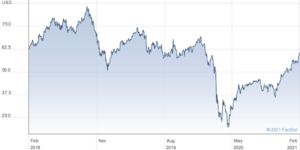How the UK electricity generation mix is changing
January 29, 2021Clean, Green, Renewable
February 19, 2021Oil is now trading close to $60 a barrel for the first time since January 2020. Oil prices collapsed in Q1 2020 when coronavirus swept through Europe and America. In April 2020 WTI (the benchmark for US oil) fell to minus $37/bbl as producers were paying buyers to take oil off them to avoid storage costs.
However, oil prices have recovered through Q4 2020 and 2021 as the global economic outlook looks more positive. The below summarises Brent Crude prices over the last three years, providing context of how oil prices have recovered in the last six months.

Why have oil prices recovered?
Brent crude is the major benchmark for oil, contracts for future delivery have increased by nearly 60% in the last three months alone. As with any commodity, supply / demand fundamentals drive the price of oil. Following the dramatic downturn in demand in 2020 a mixture of more positive signs of a global recovery have caused prices to increase.
Factors including the distribution of covid-19 vaccines, a potential $1.9trn US stimulus package, increasing oil demand in Asia and countries such as Saudi Arabia limiting output to the market have all helped prices to recover.
What does this mean for my energy contracts?
The price of oil influences the price of UK gas, gas is also still the largest single fuel in the UK electricity generation mix hence the correlation in pricing between oil prices and UK energy. Whilst there are numerous local and international factors which affect the price of your energy, oil prices are often seen as the barometer for future energy prices and economic activity. Unless there are further complications with the vaccine roll-out or complications with different variants of covid-19 it is expected the global economic recovery and price of oil may continue to increase.
Here at GLEG we monitor markets intra-day, every day to provide impartial advice on when and how businesses trade energy. For more information on oil and other factors which affect energy markets please contact hello@gleg.co.uk.
